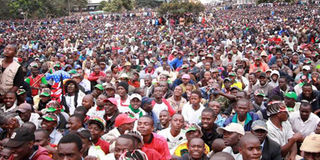Kenyan state is illegitimate but we must not just despair

Thousands of Kenyans during the promulgation of the new Constitution on August 27, 2010 at Uhuru Park, Nairobi. PHOTO | FILE | NATION MEDIA GROUP
What you need to know:
Even so, the failure of prior consensual relationships among Kenyan nationalities does not preclude consent ex-post facto, or acquiescence after the fact.
Secondly, we need to re-engineer our sense of belonging and citizenship. But this is easier said than done.
We need a towering political figure to lead us there. Our desperate situation calls for a Julius Nyerere, or a Nelson Mandela.
Is there such a person or persons in the political and elite classes? Who can “beat the tribe” out of us and plant the seeds of Kenya as an idea?
The state is the basic instrument for the organisation and regulation of the affairs of a nation. The nation describes the people — the population — of the country. It is in the nation that the people’s zeitgeist is forged. That zeitgeist, the common consciousness of the people, forms an irreducible national identity.
FACE FACTS
The crisis of the Kenyan state is that it has been unable since its founding to cohere a national character. In other words, Kenya does not exist as an idea. It is true that Kenya is a state and a country with a government, but a nation it is not. This is the question — why is Kenya not an idea, and how can we make it an idea?
States are creatures of violence and instruments of coercion. That does not mean that states are illegitimate per se. But it suggests that there is both legitimate and illegitimate state violence. The difference between the two is a question of the distance between the people and the state. In legitimate states, the people largely submit themselves to public authority. In illegitimate states, the people resist and defy public authority. Thus we need to ask — is Kenya a legitimate, or an illegitimate state? Have the people who we might call Kenyans intellectually submitted themselves to the Kenyan state? If we cast child-like sentimentality aside, the answer to this question will shock us. I fear that we will be cast adrift.
But only a fool will refuse to face facts in an imminent storm. So, let me state it clearly and plainly. The Kenyan state is largely illegitimate. However, our thinking cannot stop there, nor can we simply despair. Our obligation to ask if we can legitimise the state, and then find out how. This task is a tall order. It is a deliberative process that requires intellectual leadership by the elites. That assumes Kenya has elites who are capable of rising above themselves and their petty personal interests. If you scan history, you will realise that no country or state has ever prospered, or achieved greatness, without a great elite. That is why so many are condemned to mediocrity.
FRACTURED SOCIETY
These are our challenges as we attempt the legitimisation of the state. First, we need to admit that we are a fractured society. I know there has been debate as to whether Kenya is a cruel marriage and if we need to seek a divorce. That is the wrong question, and even a more wrong-headed diagnosis. A marriage and divorce from it presupposes the existence of consent at the outset. In practical terms, the multiple nationalities, referred to popularly as tribes, were slapped together forcibly by the British colonialists. Kenya is a creation of the British, not the handiwork of so-called Kenyans. We do not own the “patent” — the intellectual rights — to the notion of Kenya. It is not ours.
Even so, the failure of prior consensual relationships among Kenyan nationalities does not preclude consent ex-post facto, or acquiescence after the fact. Secondly, we need to re-engineer our sense of belonging and citizenship. But this is easier said than done. We need a towering political figure to lead us there. Our desperate situation calls for a Julius Nyerere, or a Nelson Mandela. Is there such a person or persons in the political and elite classes? Who can “beat the tribe” out of us and plant the seeds of Kenya as an idea? I am not suggesting we “kill” the tribe. No — I am arguing that we must subsume it in a larger, nobler identity, a robust Kenyan identity.
CORRUPTION CULTURE
Thirdly, we must guillotine the culture of corruption and those who purvey it. This is a do-or-die question. I know that Uhuru Kenyatta, the country’s CEO, has stated umpteenth times that he will not rest until he roots out corruption. But Mr Kenyatta’s tough fulminations have not been matched by requisite and resolute actions. He talks tough and then shrinks from bold action. His most senior political allies are knee-deep in corruption. They loot public coffers and flaunt it in broad daylight. This is not a secret. Even simpletons know that Mr Kenyatta is afraid to act against thieves of public money and resources. His alliance with ODM’s Raila Odinga has stiffened his back but he needs more oomph.
Finally, we need to give our people a reason to believe that they are not just paper citizens. We must give citizenship meaning. This means that we must create economic opportunity, especially for our youth. The state of the nation cannot be viable without money in the pockets of our people. We cannot be a beggardly nation and produce citizens with any modicum of dignity. It pains me every time I see Kenyans hats in hand, which is most of the time. There is only one way to build an irreversible state — to forge Kenya as an idea, not a geographical location.
Makau Mutua is SUNY Distinguished Professor at SUNY Buffalo Law School and Chair of Kenya Human Rights Commission. @makaumutua.





